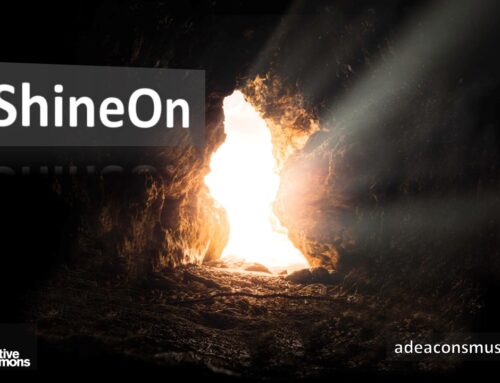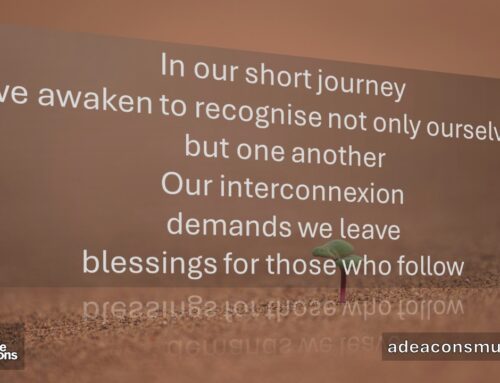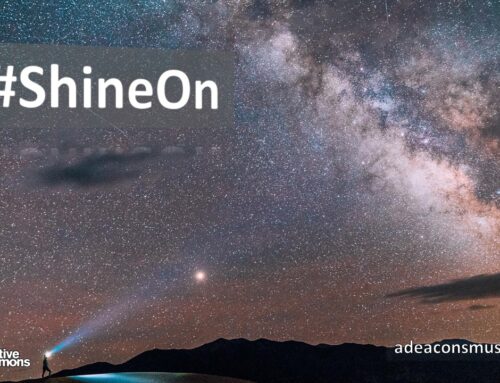The kingdom of heaven is like a mustard seed
that someone took and sowed in his field …
I love language. I love the use of words that – though admittedly clumsy and often bulky – can convey complicated images and messages with wonder. When threaded well, words can present things that make little sense in a way that almost does … Though math can present well the beauty of connexions of cause and effect, of intrinsic bindings of atom to quark, of apple to quantum, words paint paradox onto a canvas that otherwise would seem too dense, too convoluted, too inaccessible …
In our Christian context– I am not objective in case you were wondering – the height of word use is often demonstrated in Jesus’ use of parable. He took these common images and phrases, mixtures of colloquialism and metaphor and repackaged them. He undermined and subverted cultural norms and expectations in a way that was both apparent and obscure. Sometimes they made sense and other times they confused even those with whom he journeyed in ministry. It was somewhere in these words plays, the gap between what should be clear and that which was not, that meaning was and remains to be found. The seeds … well they’re right up there in the Hall of Fame as far as I am concerned.
One of the interpretations – or lenses – which speaks to me about the agrarian image of the ‘mustard seed’ is its subversive nature. Of course sowing seeds is good – hey who doesn’t want food to grow abundantly. Have you seen the way zucchini or cucumber just take over a garden, if you’re not careful? But that’s not what’s happening in this parable, well sort of.
Jesus is equating the seed sower as a weed bringer. This Christian message, the Good News, is not apparently about abundant tomatoes or a bumper crop of wheat: nope! It is – in fact – about dandelions blooming over fields awash in yellow or purple loosestrife choking out cattails in marshes and ditches. In other words, those who endeavour into discipleship are being equated with intentionally planting invasive species in a crop that is meant to feed people. And – as though the subversive part is not rebellious enough –the implication is that what everyone eats is actually bad for them and the weeds are not!
the field is the world,
and the good seed are the children of the kingdom;
the weeds are the children of the evil one
Okay, hopefully we’re not totally confused at this point (thought the original hearers may very well have been), because further in the text Jesus does that ‘mixed metaphor’ thing with the parable that is unsettling. There’s gnashing of teeth, a supposed binary or those who are ‘good’ and those who are ‘evil.’ Both are planting in this field where sometimes what’s supposed to be a good crop is a bad one and a bad one is good. Then there’s the twist that what’s good is actually good and bad actually bad … there’s a few more flips in there, but you get the gist … ummm … right?
So what? What’s this have to do with anything about the church? I think it speaks a great deal to us in ways with which we are still uncomfortable. I think – or maybe it’s just my imagination – that the parable remains true: we are and will always be sower of seeds. The question, in this time of cultural shifting, changing and transformation, is what is nature of the soil into which we are planting? And – perhaps even more importantly – what is our intention?
Church has changed and is changing – no one who parks her/his spiritual journey in a religious institution has not either experienced this or heard that lament. And, if – as the metaphor goes – we have been called to sow seeds, but the till and soil has changed, do we then need to ask what we intend to grow? Do we want more of what we had, which is no longer? Do we long for a past that clearly is no longer tenable in the present journey toward that which will be? How is our sowing risk-filled, as it was for the Early Church?








What might the writer of Matthew be saying to us somewhat less inclined to horticulture? What would the contemporary mustard seed look like? Some of us have exchanged the hoe for the touch screen. What would the mustard seed parable look like on the interweb?
Those are great questions Richard! What metaphors do you think would parallel the use of seeds in such a textured manner? Is there an image that is forefront for you that we might explore?